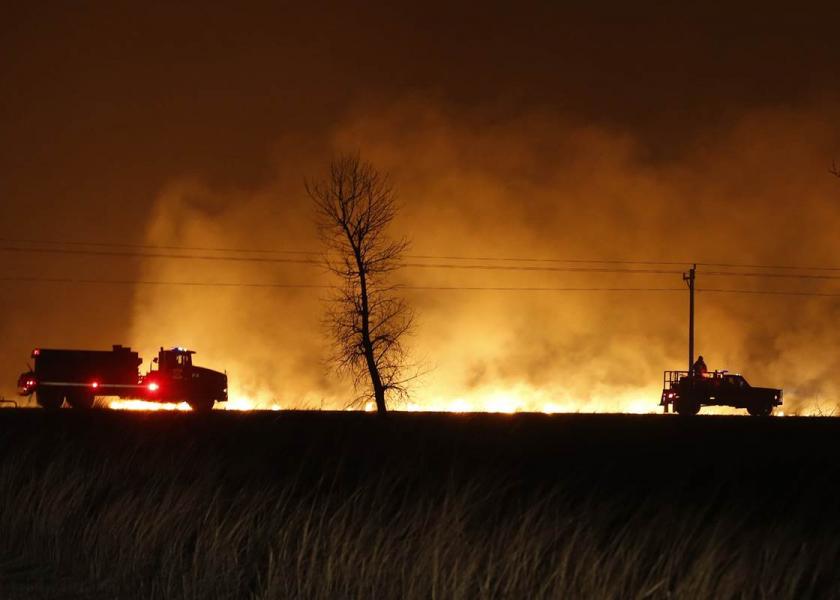Fellowship to Improve Communication of Wildfire Drivers

According to the California Department of Forestry and Fire Protection, the 2021 fire season has consumed more than 1.57 million acres, an increase of 42% from this point last season. The Dixie Fire alone has already burned more than 725,000 acres in Northern California and is only 40% contained.
The 2020 fire season in California was the worst in the state’s history, and the 2021 season appears to be on pace to greatly surpass that mark. And while many of the same techniques and resources have been used to battle the fires in both years, there has been a big difference in how we talk about what’s causing them.
The 2020 fire season became controversial because of the degree in which the drivers of the fires’ severity, such as climate change, were politicized and taken out of context on social media, often in a Twitter battle between the federal government and California leadership. Accurate and effective communication about the causes, drivers and means of fighting these fires, now and in the future, has become necessary.
Two researchers in the College of Agricultural Sciences & Natural Resources (CASNR) at Texas Tech University have created a suite of fellowships with the goal of training the next generation of experts who are highly adept at both forest resource management and science communication.
The proposal by assistant professor Nathan Gill in the Department of Natural Resources Management (NRM) and assistant professor of practice Lindsay Kennedy in the Department of Agricultural Education & Communication (Ag Comm), aims to award fellowships to two master’s students and two doctoral students, who will use transdisciplinary coursework, workshops, service learning, peer-to-peer research and a capstone project to attain their expertise in these areas.
The fellowships are backed by a $241,000 grant from the U.S. Department of Agriculture (USDA) National Institute of Food and Agriculture’s Cooperative State Research Education & Extension Service.
“The National Needs Fellowship grants program of the USDA is intended to sponsor the training of experts in priority areas of agriculture and natural resource management,” Gill said. “We are enthusiastic to create fellowships through this grant for graduate students who will be rigorously trained in both science communication and fire ecology and management. The fellows will go on to careers where both effective communication skills and a keen understanding of wildland fire are both urgently needed.”
Because of the nature of the fellowships, success will be measured by factors beyond just grades earned. Each fellow will have the opportunity to earn a degree either through NRM or Ag Comm, with Gill and Kennedy serving as faculty advisers. The fellows’ success will be tracked in terms of retention, graduation and career placement to analyze the effectiveness of each component of the fellowship.
The goal is to have these fellows placed in roles where their expertise is greatly needed and where they can have a national impact in the forest service, where the nuances of the relationship between wildfires, climate and forest service management are not only understood but communicated effectively. The hope also is that fellows who enter the forest resources workforce will help inspire creativity and increase the value of a company’s employee knowledge, skills and business training with their expertise gained from the fellowship.
“Now, more than ever, there is a great need for effective science communication,” Kennedy said. “This fellowship program is another example of the valuable cooperative efforts between NRM and our agricultural communications program to place knowledgeable and qualified individuals into the workforce to help solve real world problems impacting our natural resources.”
Texas Tech’s standing as a Hispanic-Serving Institution presents an opportunity to recruit and admit underrepresented students into the fellowship. Toward that end, the fellowship will strongly encourage members of underrepresented groups to apply for the fellowship, stating that at least 30% of applicants interviewed for the fellowship will be those who indicate an underrepresented minority status on their application. This approach, in the past, has led to the successful recruitment of an ethnically diverse student body.
Gill and Kennedy also serve as co-directors of the Bridge Adventure program within CASNR, which focuses on transformational experiential learning for diverse undergraduate students. They say this fellowship could integrate into the Bridge Adventure program because it gives students the chance to engage in field research that aligns with fellows’ thesis and dissertation objectives. Fellows also could mentor a team of undergraduate Bridge Adventure students to develop leadership skills while receiving assistance with research.
The fellowship also could align with the Matador Institute of Leadership Engagement (MILE), for which Kennedy serves as program director. The MILE program creates graduates who possess a diverse perspective of big-picture issues that affect agriculture and natural resources, and it could serve as a launching pad in recruiting potential fellows who hold an understanding of key issues within the industry.
Fellows will have opportunities to shadow current leaders in forest management and communication, participate in workshops and service learning with existing U.S. Forest Service partners and learn a wide variety of skills and approaches from the cross-departmental course requirements between NRM and Ag Comm.







